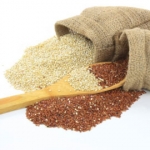 If you’re a patient of a bariatric procedure like gastric bypass, you’re probably used to the search for new and healthy foods that fit into your dietary guidelines. Eating the same things over and over can get quite boring, so finding new, good-tasting foods that contribute to your weight loss diet is an important part of keeping things interesting.
If you’re a patient of a bariatric procedure like gastric bypass, you’re probably used to the search for new and healthy foods that fit into your dietary guidelines. Eating the same things over and over can get quite boring, so finding new, good-tasting foods that contribute to your weight loss diet is an important part of keeping things interesting.
Whole grains are an important part of any diet. Getting the recommended daily intake of whole grains—an average of three servings per day, though you should stick to any dietary rules given to you by your weight loss surgeon—can help to reduce your risk of developing numerous health conditions like type 2 diabetes, cardiovascular disease and many kinds of cancer. Studies have also shown that replacing processed grains with whole grains can help in reducing abdominal fat, which can otherwise increase cholesterol levels and blood pressure.
Here are some less-common grains that would make a great addition to any weight loss diet:
- Quinoa. This miniscule seed was once a dietary staple of the ancient Incas and packs a unique nutritional punch. With a texture reminiscent of couscous and a slightly nutty flavor, quinoa is full of protein and essential nutrients like iron, magnesium, manganese and fiber. It’s also a good source of all the essential amino acids that can’t be produced by our body, especially lysine, which is responsible for growing and repairing bodily tissues. Though typically expensive, quinoa’s nutritional qualities are well worth the price.
- Amaranth. High in fiber and packed with protein (9 grams per cup), amaranth was once labeled a weed, but is now well-known as a highly nutritional grain. It contains lysine, as well as nutrients like calcium and magnesium and squalene, which may help in the prevention of cancer. Studies of amaranth’s effects on hamsters have also shown an ability to reduce cholesterol, although more research is needed to confirm this impact in humans.
- Sorghum. This handy grain has a higher antioxidant content than so-called “superfruits” like pomegranates and blueberries. It can be used in a variety of different ways: you can pop it like popcorn, use it to replace flour in baked goods, cook it into porridge or even use it to brew beer. Sorghum is especially notable for sufferers of celiac disease, as it is entirely gluten-free.
- Barley. An ancient grain, barley can be used in a variety of dishes and provides about one quarter of daily recommended fiber intake in each cup. It can be made into flour for baked goods while the polished “pearled barley” can be added to any stew or soup. Its high fiber content makes it good for digestion and lowering cholesterol, which is perfect for any weight loss diet.


